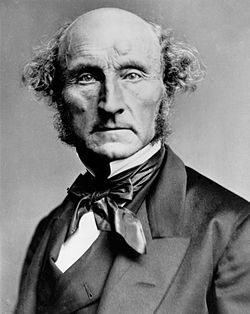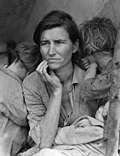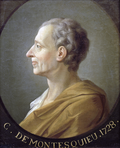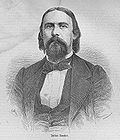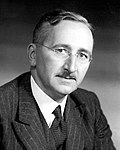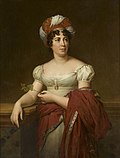
Back بوابة:ليبرالية Arabic Portal:Liberalizm Azerbaijani Πύλη:Φιλελευθερισμός Greek درگاه:لیبرالیسم Persian Portail:Libéralisme French Портал:Либерализм Russian ද්වාරය:ලිබරල්වාදය Singhalese Portal:Liberalizm Turkish Portal:自由主义 Chinese
The Liberalism portal
Liberalism is a political and moral philosophy based on the rights of the individual, liberty, consent of the governed, political equality, the right to private property, and equality before the law. Liberals espouse various and sometimes conflicting views depending on their understanding of these principles but generally support private property, market economies, individual rights (including civil rights and human rights), liberal democracy, secularism, rule of law, economic and political freedom, freedom of speech, freedom of the press, freedom of assembly, and freedom of religion. Liberalism is frequently cited as the dominant ideology of modern history.
Liberalism became a distinct movement in the Age of Enlightenment, gaining popularity among Western philosophers and economists. Liberalism sought to replace the norms of hereditary privilege, state religion, absolute monarchy, the divine right of kings and traditional conservatism with representative democracy, rule of law, and equality under the law. Liberals also ended mercantilist policies, royal monopolies, and other trade barriers, instead promoting free trade and marketization. The philosopher John Locke is often credited with founding liberalism as a distinct tradition based on the social contract, arguing that each man has a natural right to life, liberty and property, and governments must not violate these rights. While the British liberal tradition emphasized expanding democracy, French liberalism emphasized rejecting authoritarianism and is linked to nation-building. (Full article...)
Selected article -
Individual contributors to classical liberalism and political liberalism are associated with philosophers of the Enlightenment. Liberalism as a specifically named ideology begins in the late 18th century as a movement towards self-government and away from aristocracy. It included the ideas of self-determination, the primacy of the individual and the nation as opposed to the state and religion as being the fundamental units of law, politics and economy.
Since then liberalism broadened to include a wide range of approaches from Americans Ronald Dworkin, Richard Rorty, John Rawls and Francis Fukuyama as well as the Indian Amartya Sen and the Peruvian Hernando de Soto. Some of these people moved away from liberalism while others espoused other ideologies before turning to liberalism. There are many different views of what constitutes liberalism, and some liberals would feel that some of the people on this list were not true liberals. It is intended to be suggestive rather than exhaustive. Theorists whose ideas were mainly typical for one country should be listed in that country's section of liberalism worldwide. Generally only thinkers are listed whereas politicians are only listed when they also made substantial contributions to liberal theory beside their active political work. (Full article...)
Selected biography -
John Stuart Mill (20 May 1806 – 7 May 1873) was an English philosopher, political economist, politician and civil servant. One of the most influential thinkers in the history of liberalism and social liberalism, he contributed widely to social theory, political theory, and political economy. Dubbed "the most influential English-speaking philosopher of the nineteenth century" by the Stanford Encyclopedia of Philosophy, he conceived of liberty as justifying the freedom of the individual in opposition to unlimited state and social control. He advocated political and social reforms such as proportional representation, the emancipation of women, and the development of labour organisations and farm cooperatives.
The Columbia Encyclopedia describes Mill as occasionally coming "close to socialism, a theory repugnant to his predecessors". He was a proponent of utilitarianism, an ethical theory developed by his predecessor Jeremy Bentham. He contributed to the investigation of scientific methodology, though his knowledge of the topic was based on the writings of others, notably William Whewell, John Herschel, and Auguste Comte, and research carried out for Mill by Alexander Bain. He engaged in written debate with Whewell. A member of the Liberal Party and author of the early feminist work The Subjection of Women, Mill was also the second Member of Parliament to call for women's suffrage after Henry Hunt in 1832. (Full article...)
List of selected biographies
|
|---|
Selected quote
General images
Subcategories
Related portals
WikiProjects
Topics
Recognized content
Associated Wikimedia
The following Wikimedia Foundation sister projects provide more on this subject:
-
Commons
Free media repository -
Wikibooks
Free textbooks and manuals -
Wikidata
Free knowledge base -
Wikinews
Free-content news -
Wikiquote
Collection of quotations -
Wikisource
Free-content library -
Wikiversity
Free learning tools -
Wiktionary
Dictionary and thesaurus
